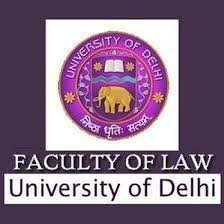DU LLB Entrance Exam | Eligibility, Exam Pattern – All you need to know
About DU LLB Examination
Law as a career not only helps one to grow professionally but also empowers one by making aware of the rights and brings a sense of confidence from within. University of Delhi is a Central University. It is a three-year course which one can pursue after completing his/her graduation degree in any of the courses. DU LLB entrance exam is considered to be most competitive exam for law. A lot of students appear for this exam every year and few of them are able to crack the test.
University of Delhi has very rich alumni
Judges of the Supreme Court of India
Current
- D.Y.Chandrachud
- Madan B. Lokur
- Sanjay Kishan Kaul[26]
- Navin Sinha[26]
- Rohinton Nariman, also a former Solicitor General of India
- Arjan Kumar Sikri[26]
- Indu Malhotra [27]
Former
- D Y Chandrachurn – Chief Justice of India.
- Ranjan Gogoi
- Deepak Gupta
- Madan Mohan Puncchi – former Chief Justice of India
- Vikramajit Sen
- Lokeshwar Singh Panta6]
Judges of International Supreme Courts
- Tshering Wangchuk – Current Chief Justice of the Supreme Court of Bhutan
- Rinzin Penjor – Judge of the Supreme Court of Bhutan
Law Officers of Government
- Pinky Anand – Additional Solicitor General of India
- Bishwajit Bhattacharyya – Former Additional Solicitor General of India.[31]
- Gopal Subramaniam Former Solicitor General of India[32]
- Mohan Parasaran– Former Solicitor General of India
- Siddharth Luthra – Former Additional Solicitor General of India.
Politics and Advocate
- Arun Jaitley – Finance Minister, Government of India.
- Ajit Jogi – Former Chief Minister of Chhattisgarh.
- Ashwani Kumar – Former Law Minister, Government of India
- Bhupinder Singh Hooda – Former chief minister of Haryana
- Jarbom Gamlin – Former Chief Minister of Arunachal Pradesh
- Kapil Sibal – Former Cabinet Minister of Human Resource Development, Communications and Information Technology and Ministry of Law.
Eligibility criteria for DU LLB
- The aspirant needs to have undergone and cleared the graduation or post-graduation exam from the University of Delhi or any other equivalent University.
- There is no age limit to give the exam of DU LLB, anybody of any age having a graduation or post-graduation degree can appear for the exam.
- There is no restriction on the ‘number of attempts’. Aspirants can give the DU LLB exam as many times as they want there is no restriction of the number of times you appear for the exam.
- A candidate of general category needs to score at least 50% marks in aggregate in graduation or post-graduation degree or equivalent grade to be eligible for the admission. The candidates of OBC, PWD and CW category need to score at least 45% marks in aggregate or the equivalent grade and the candidates of SC and ST category need to score at least 40% marks in the aggregate or the equivalent grade in order to qualify for the admission in DU LLB.
- A candidate pursuing LLB from any university will not be eligible for admission to DU LLB until he/she cancels the existing programme at the time of admission.
University of Delhi offers a total number of 2658 seats for its LLB programme. The seats are distributed amongst three centres i.e. campus law centre (CLC), Law centre I (LCI) and Law centre II (LCII). All the three centres are under Delhi University and there is no difference between the method of teaching and examinations amongst the three centres.
Following is the reservation criteria in DU LLB
| Category | Percentage of reservation | Centre
|
total | ||
| CLC | LCI | LCII | |||
| General (UR) | 389 | 389 | 389 | 1167 | |
| Other backward classes (OBC) | 27% | 208 | 208 | 208 | 624 |
| Schedule castes (SC) | 15% | 116 | 116 | 116 | 348 |
| Schedule tribes (ST) | 7.5% | 57 | 57 | 57 | 171 |
| Persons with disability (PWD) | 5% | 39 | 39 | 39 | 117 |
| Foreign applicants (FN) | 5% | 38 | 38 | 38 | 114 |
| Children/wives of army personnel (CW) | 5% | 39 | 39 | 39 | 117 |
| TOTAL | 886 | 886 | 889 | 2658 | |
Exam Pattern
The question paper only includes multiple-choice questions and is divided into 4 sections:
- English language comprehension,
- Analytical ability,
- Current affairs and general knowledge,
- Legal Aptitude.
Further, each section is then dissected into various other topics that test the mental ability of a student as well the general awareness.
Book for preparations
There are books available for the preparation of the DU LLB entrance.
- Universal’s Guide to CLAT and LL.B. Entrance Examination
- Current affairs and General knowledge: A daily read of a newspaper, national, international, sports, science and technology, art and culture, politics, books and authors, geography, history, etc.
- Legal awareness- the candidates will be tested on the legal aptitude. A set of facts will be given, on the basis of which students will be required to answer the asked questions using their legal aptitude and knowledge. The questions will be on the following topics- Indian Penal Code, family law, Indian Contract Act, the constitution of India, Law of Tort, Legal maxims, the important landmark Supreme Court judgements etc.
Also Read: State of Bombay and Ors. v. F.N. Balsara:- Case Analysis




![Call for Campus Ambassadors by Our Legal World [2 Months; Virtual]: Apply by June 15](https://www.ourlegalworld.com/wp-content/uploads/2024/06/Logo-New-136x150.png)


